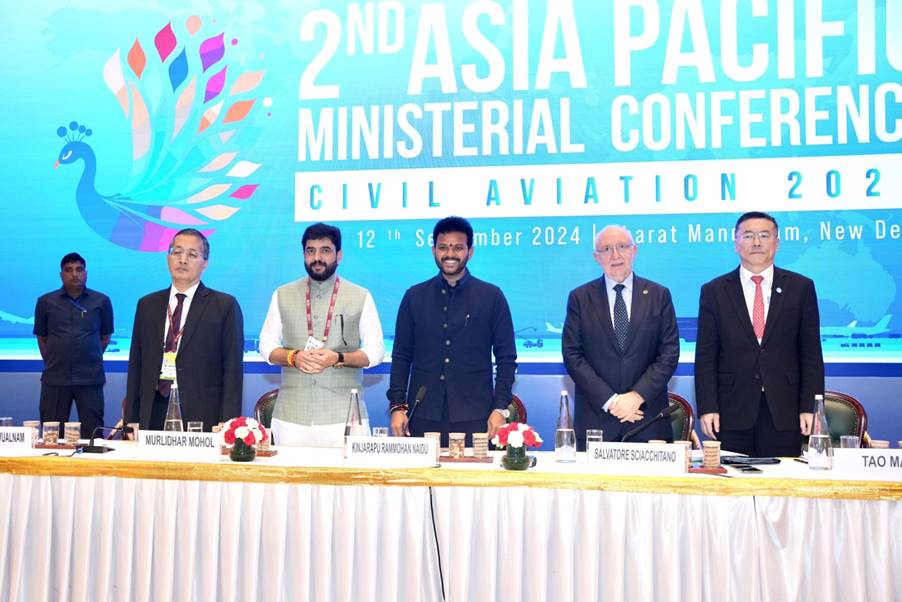Calls for strategic investments in Asia-Pacific Aviation Infrastructure to accommodate 3.5 billion annual passengers by 2035.
NEW DELHI: Union Minister for Civil Aviation Kinjarapu Rammohan Naidu inaugurated the 2nd Asia-Pacific Ministerial Conference on Civil Aviation (APMC).
Addressing the conference, Rammohan Naidu expressed his gratitude to the President of ICAO for his unwavering support and congratulated ICAO on its 80th anniversary, recognizing its role in advancing global aviation standards and safety. He lauded the enthusiasm of the delegates and emphasized that the conference reflects the shared vision of the Asia-Pacific region to build a more connected, resilient and robust aviation landscape.
One of the highlights was Kinjarapu Ram Mohan Naidu’s nomination as Chairman of the APMC after being nominated by Singapore and recommended by Bhutan. Solomon Islands and Nepal supported the nomination of Viliame Rogoibuli Gavoka, Deputy Prime Minister and Minister for Tourism and Civil Aviation of Fiji, as Vice Chairman of the conference.
Highlighting the Growth Story of Civil Aviation in the Asia-Pacific Region, the Union Minister noted that commercial aviation in the region began nearly a century ago, and today, the region is poised to become the largest aviation market by 2035, with over 3.5 billion passengers annually. He called for strategic investments in infrastructure and collaboration among regional stakeholders to ensure sustainable and balanced growth across the sector.
Rammohan Naidu outlined India’s rapid advancements in aviation under the leadership of Prime Minister Narendra Modi. Naidu said, “India's airport infrastructure has expanded from 74 operational airports in 2014 to 157 in 2024, with plans to increase this number to 350-400 by 2047”. He also added that the domestic air passengers have more than doubled in the past decade, with Indian airlines significantly expanding their fleets. He also emphasized the government’s focus on world-class infrastructure with the development of new international airports and the expansion of major airports like Delhi, Kolkata, and Chennai.
The Civil Aviation Minister also shared India's successful Regional Connectivity Model through the UDAN scheme, which has opened up 583 new regional routes and made air travel accessible to underserved and unserved regions. He reiterated India’s commitment to making flying affordable for all citizens, with a vision of integrating helicopters, seaplanes, and widebody aircraft under the UDAN scheme.
Emphasizing on the three pillars of aviation—Infrastructure, Integration, and Innovation, Rammohan Naidu underscored “How India has been leading the way in incorporating modern technologies like Digi Yatra, a biometric-based digital tool for seamless travel. He also highlighted India’s recent regulatory advancements in Vertical Take-Off and Landing (VTOL) aircraft, paving the way for sustainable and innovative urban air mobility.”
Recalling India’s efforts in fostering a robust drone innovation ecosystem with initiatives like the Drone Didi Yojna, which aims to train 15,000 women in operating drones for agricultural purposes. The minister shared that drones have been effectively used in sectors like healthcare, rural development, and disaster relief, further enhancing economic growth and job creation.
Rammohan Naidu also stressed on the government’s focus on creating a conducive business environment in aviation, with policies supporting Maintenance, Repair, and Overhaul (MRO) services, aircraft leasing, and indigenous manufacturing. The Minister highlighted the introduction of new MRO Guidelines and the permitting of 100% FDI through automatic route have been key steps towards making India a global aviation hub.
The aviation minister reaffirmed India’s commitment to safe and secure air travel, calling for greater collaboration among nations to uphold aviation safety standards. He also urged the nations in Asia-Pacific region to work together on improving navigation systems and safety in air traffic management.
Recognizing the global need for sustainable aviation, Rammohan Naidu called for increased adoption of Sustainable Aviation Fuels (SAF) and energy-efficient airport infrastructure. He highlighted India’s goal to blend SAF with jet fuel for international flights and shared the success of carbon-neutral airports in Delhi, Mumbai, and Cochin.
The Minister emphasized India’s leadership in promoting gender equality in aviation, with women constituting 15% of the country’s pilots, three times the global average. India’s target is to increase women’s participation in the aviation workforce to 25% by 2025. Naidu concluded by calling for a collaborative effort among Asia-Pacific members to build a skilled aviation workforce, integrate advanced air mobility technologies, and ensure the sector's sustainability. He expressed optimism for the adoption of the Delhi Declaration, which will serve as a roadmap for elevating aviation in the Asia-Pacific region.


